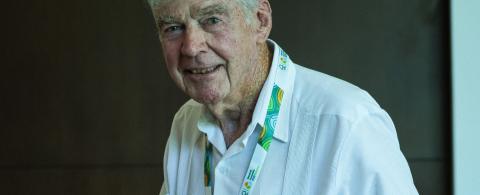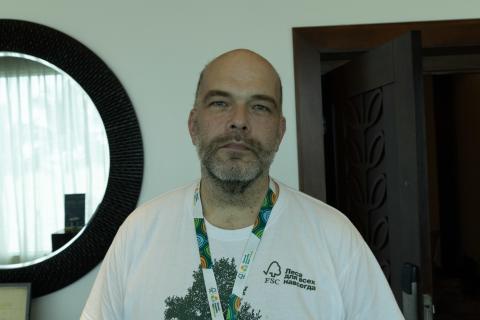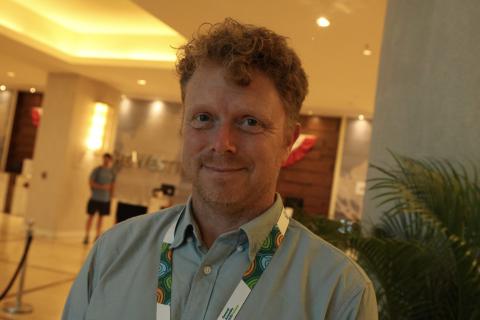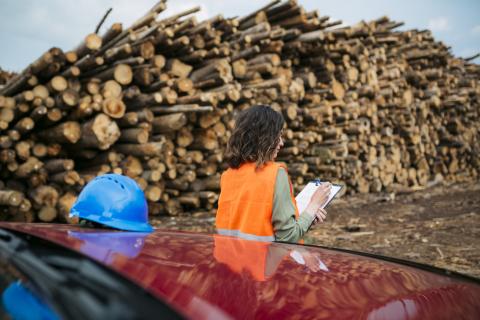A newcomer’s perspective
A virgin to the extraordinary dynamism of the FSC General Assembly, in this extended online interview Josh Tosteson shares his thoughts from his “first time” in Kota Kinabalu. He takes a thought-provoking angle and challenges the FSC community to focus on what really matters.
FSC General Assembly 2011
A virgin to the extraordinary dynamism of the FSC General Assembly, Josh Tosteson shares thought from his “first time” in Kota Kinabalu. He takes a thought-provoking angle and challenges the FSC community to focus on what really matters.
Foresters and community members from the world’s rain forests… executives of transnational corporations… activists from civil society and environmental groups… political and diplomatic functionaries… researchers… a whirling picture of the human drama in all of its diversity, with the players all assembled for a clear common cause: to build a voluntary endeavour to turn the gut-wrenching tide of deforestation and establish into perpetuity a sustainable relationship between humanity and the Earth’s forests. This is what FSC and its General Assembly are about.
As a newcomer to the FSC community and the GA, I have been witnessing this event with passionate curiosity. After all, if FSC – with its committed assemblage of members across all domains of human life - can’t catalyse the transition to sustainable forest management, who can? And the stakes cannot be higher for what remains of our planet’s ecological crown jewels – an ever diminishing intact ancient forests – the biodiversity, climate regulation, clean water, food, fibre, medicines, and myriad timber-based forest products that they and all forests humbly provide to humanity.
There is no time to waste.
So I offer a few “newcomer’s” impressions of the proceedings from the perspective of someone who cares with all my heart that these efforts are not in vain – that FSC is in fact putting itself into position to deliver on its sacred mission.
As I see it, FSC is at a critical moment in its evolution. While the growth of the system to date has been impressive, it’s now at a point where the system needs to scale-up and mainstream, where responsible forest management becomes a given and there is no longer a viable market for “conventional” irresponsibly produced forest products. What are the key elements that the system needs to have in place to enable this transition, and how – on the basis of what I am seeing at the GA – is it doing?
First and foremost, the standards themselves – and the way they are implemented and evaluated on the ground – need to deliver in reality the concept of “sustainable” forest management (SFM). The challenges here include the tension between maintaining the key elements that make FSC the gold standard, and the need to bring the huge number of less-responsible producers into the system and on the path to SFM. Also, the system must promote real auditing quality on the ground based on consistent high performance by certification bodies; while cost reduction is critical for scale, it cannot be accompanied by a “race to the bottom”, putting the system’s integrity at stake.
Another indispensible element required for mainstreaming of SFM is to achieve critical mass in the preferences of buyers for SFM-derived forest products. This requires a definitive shift in the consciousness of businesses and consumers, including an acceptance of the fact that we will all need to pay a little more to internalise the costs of forest degradation. Without this commitment, what is the impetus for companies to invest in certification?
Finally, FSC needs to have a good handle on the wider, long-term issues that will impact the elements discussed above, including macro-market evolution, government regulation and policy, and build into the system a strategic plan that both anticipates and drives change toward a clear vision of the sustainable world. This world will, for example, abolish the notion of products that have a cradle and a grave, replaced instead by design-driven, recycle-reuse material flows.
Based on the motions and discussions I have seen during this GA, these kinds of issues are clearly in the minds of many stakeholders and are under active discussion. But are they rising to the level of importance that they demand? Or are they drowning out in the noise of other, narrower issues also competing for attention?
These questions relate to the governance of the system and the operation of FSC as an organisation. From what I have seen thus far, this governance challenge stands as the most critical one for the system, and I believe is the area where FSC has the most work to do.
All democratic systems face the challenge of cutting through interest-group politics, and this ultimately is the challenge of leadership. Not necessarily of one individual at the top of an organisation, but of EACH taking a step back, viewing their own interests within a broader context of the collective good, and working relentlessly in service of that common good.
It’s the only way for democratic systems to avoid reducing themselves to the inertia of partisanship. I have not yet seen enough of the FSC’s organisational culture to say whether we are really practicing this, but I can say that our success – and the fate of the world’s forests – will ultimately hinge on the extent to which we do so, member by member, stakeholder by stakeholder.
Let us be the change we wish to see in the world!
Josh Tosteson, Rainforest Alliance



